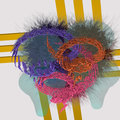Archive
17 April 2020
Bertus Beaumont: "I believe in the power of a more personal approach to education"
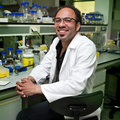
"I memorize all the names of my students and speak to them during the lecture. Yes, even the names of the eighty students who take my bachelor's course!" laughs Bertus Beaumont. He specialises in evolutionary biology and teaches three subjects on behalf of BN/Bionanoscience. "I am committed to renewing education with a personal and multidisciplinary approach." This interview is part of a series of articles on innovation in education and was conducted before the start of the corona crisis.
09 April 2020
Researchers create tiny self-powered temperature sensors
A team of researchers from the University of Oxford, Delft University and IBM Zurich have demonstrated that graphene can be used to build sensitive and self-powering temperature sensors. The findings pave the way for the design of highly sensitive thermocouples, which could be integrated in nanodevices and even living cells.
09 April 2020
Anton Akhmerov: "Teaching online is the way to go"
All the material that 'quantum tinker' Anthon Akhmerov treats in his lectures can be found on a website he set up. Like the bachelor's course Solid State Physics, which he gives to about 200 students each year." Since everything was already online, teaching at a distance during the corona crisis is relatively easy for me to do."
02 April 2020
The strength of collagen
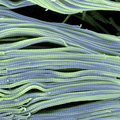
Collagen is the glue that holds our bodies together. It can be found in our skin, bones, muscles, cartilage, ligaments, hair, nails - in short, in almost every tissue in our body. In some places, for example in the skin, collagen proteins form networks that are very elastic. But why these networks are so elastic has so far been unclear. Researchers from Delft University of Technology, AMOLF and Wageningen University & Research have now discovered that the number of 'intersections' plays an important role. Between three and four connections per intersection is ideal. In fact, more connections makes the collagen networks less elastic. The new insights can be used, among other things, to repair damaged or aged tissue, such as cartilage or skin, and to grow new skin tissue for burn victims.
31 March 2020
ERC Advanced Grant for Cees Dekker and Lieven Vandersypen
10 March 2020
Researchers organically engineer solar cells using enzymes in papaya fruit
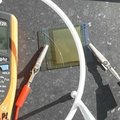
Titanium dioxide (titania) thin films are commonly used in various types of solar cells. The fabrication methods that are currently used to create such titania films require high temperatures, as well as expensive, high-end technologies. Researchers at Delft University of Technology (TU Delft) have now developed a fully organic method to engineer porous titania thin films at relatively low temperatures.
06 March 2020
Light flows around corners unhindered
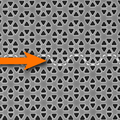
Researchers of AMOLF and TU Delft have seen light propagate in a special material without it suffering from reflections. The material, a photonic crystal, consists of two parts that each have a slightly different pattern of perforations.
05 March 2020
2020 Soft Matter Lectureship awarded to Valeria Garbin

The Royal Society of Chemistry has announced Dr Valeria Garbin as the recipient of the 2020 Soft Matter Lectureship. This annual award was established in 2009 to honour an early-stage career scientist who has made a significant contribution to the soft matter field.
04 March 2020
Zigzag DNA
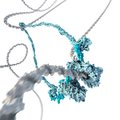
DNA in a cell can normally be compared to spaghetti on one’s plate: a large tangle of strands. To be able to divide DNA neatly between the two daughter cells during cell division, the cell organises this tangle into tightly packed chromosomes. A protein complex called condensin has been known to play a key role in this process, but biologists had no idea exactly how this worked. Until February 2018, when scientists from the Kavli Institute at Delft University of Technology, together with colleagues from EMBL Heidelberg, showed in real time how a condensin protein extrudes a loop in the DNA. Now, follow-up research by the same research groups shows that simple bundling up such loops is by no means the only way condensin packs up DNA. The researchers discovered an entirely new loop structure, which they call the 'Z loop'. They publish this new phenomenon in Nature on 4 March, where they show, for the first time, how condensins mutually interact to fold DNA into a zigzag structure.
02 March 2020
The magnet that didn’t exist
